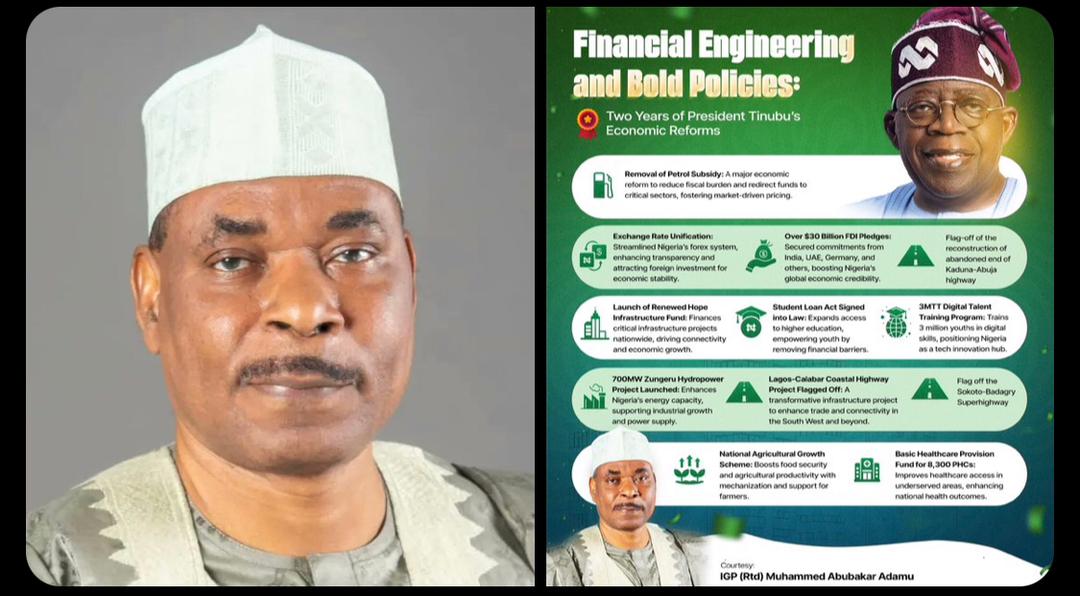In a heartfelt goodwill message marking the second anniversary of President Bola Ahmed Tinubu’s administration on May 29, 2025, former Inspector-General of Police (IGP) Mohammed Abubakar Adamu has hailed the Nigerian leader for what he describes as “significant achievements” and a “highly impactful and transformative” leadership. Adamu’s commendation, reported by reputable sources such as Tribune Online and posts circulating on X, underscores the strides made by Tinubu’s administration in its first two years, highlighting progress across key sectors and a resolute approach to governance that has sparked both optimism and debate among Nigerians. As the nation reflects on Tinubu’s tenure, this milestone offers a moment to delve into the policies, reforms, and challenges that have defined his presidency thus far.
A Transformative Vision in Action
Mohammed Abubakar Adamu, who served as Nigeria’s Inspector-General of Police from 2019 to 2021, praised Tinubu’s leadership for its inclusive approach and tangible results. In his statement, Adamu described the administration’s accomplishments as “clear evidence of a focused and determined leadership,” emphasizing that the progress made in critical areas such as security, infrastructure, and economic reforms demonstrates a commitment to resetting Nigeria’s strategic foundation. He urged Nigerians to rally behind the government’s reform initiatives, expressing confidence that the next phase of Tinubu’s presidency would yield even greater benefits for the nation.
Adamu’s remarks come at a time when Tinubu’s administration has been navigating a complex landscape of economic challenges, security concerns, and political dynamics. Since assuming office on May 29, 2023, Tinubu has pursued bold and often controversial reforms aimed at revitalizing Nigeria’s economy and addressing longstanding structural issues. His administration’s policies have sparked a mix of praise and criticism, with supporters lauding his decisive actions and detractors pointing to the immediate hardships faced by many Nigerians.
Key Achievements Highlighted
While Adamu’s statement did not delve into specific achievements, other sources provide insight into the milestones celebrated by Tinubu’s supporters. According to a post on X by
@abdullahayofel
, the administration has made significant strides in economic management, social welfare, and infrastructure development. Notable accomplishments include:
-
Economic Reforms and Debt Management: The Tinubu administration has cleared over $10 billion in foreign exchange (FX) debt, including $5 billion in outstanding FX obligations, bolstering Nigeria’s financial standing. Revenue generation has soared, exceeding N9.1 trillion, with a trade surplus of N18.86 trillion in 2024, representing a 209.6% increase. These figures reflect efforts to stabilize the economy and enhance Nigeria’s global trade position.
-
Social Welfare and Empowerment Programs: Over 900,000 Nigerians have benefited from the Presidential Loan and Grant Scheme, while more than 300,000 students have accessed the Students’ Loan Scheme, aimed at improving access to education. These initiatives underscore Tinubu’s focus on empowering vulnerable populations and fostering human capital development.
-
Infrastructure Development: The administration has prioritized infrastructure, with projects such as the Abuja Metro Rail and numerous road constructions across the country cited as evidence of progress. The Secretary to the Government of the Federation, Senator George Akume, also highlighted the commissioning of critical infrastructure during Tinubu’s first year, emphasizing its role in driving economic growth.
-
Security Gains: One of the most celebrated claims is the administration’s reported success in combating insurgency. Akume credited Tinubu with “defeating Boko Haram terrorists” within his first year, supported by the surrender of 103 Boko Haram and ISWAP terrorists and their families in Borno State between May 21 and May 23, 2024. Additionally, Defence Minister Mohammed Badaru reported that security forces neutralized over 9,300 bandits and insurgents and arrested 7,000 in the past year, signaling a robust approach to tackling insecurity.
-
Regional Development Commissions: The establishment of development commissions for Nigeria’s six geopolitical zones—South West, North East, North West, South East, North Central, and South South—has been touted as a step toward addressing regional disparities and fostering inclusive growth. These commissions aim to drive localized development and ensure equitable distribution of resources.
Navigating Economic Challenges
Despite these achievements, Tinubu’s tenure has not been without controversy. His decision to remove fuel subsidies shortly after taking office led to a sharp increase in fuel and food prices, exacerbating the cost-of-living crisis for millions of Nigerians. In Kano, for instance, bread seller Abubakar Sheka noted that customers are now focused solely on affordability, while charity worker Abubakar Ameer reported a doubling in the number of people seeking food aid. The government’s cash transfers of $54 over three months to the poorest families have been criticized as insufficient to alleviate widespread hardship.
Tinubu has defended these reforms as necessary for long-term economic stability, arguing that they are beginning to bear fruit. In his Independence Day speech on October 1, 2024, he pleaded for patience, acknowledging the struggles faced by Nigerians but emphasizing the need for bold reforms to reset the economy. The removal of fuel subsidies, a policy that had kept fuel prices artificially low, was a cornerstone of his economic strategy, aimed at redirecting funds to critical sectors like infrastructure and social welfare. However, the immediate impact has been a surge in inflation, with the cost of living more than doubling for Nigeria’s 210 million people.
Security and Governance Reforms
On the security front, Tinubu’s administration has made notable appointments to strengthen Nigeria’s security architecture. The appointment of Kayode Egbetokun as Inspector-General of Police in June 2023, replacing Usman Alkali Baba, was a significant move. Egbetokun, a former chief security officer to Tinubu during his time as Lagos State governor, is seen as a capable leader tasked with addressing Nigeria’s multifaceted security challenges, including terrorism, kidnapping, and armed robbery. The appointment of Yahaya Abubakar as Deputy Inspector-General, representing the Northeast, further reflects Tinubu’s efforts to ensure regional balance in security leadership.
Tinubu’s restructuring of the Nigerian National Petroleum Corporation (NNPC) and his ambitious goal to increase oil production to two million barrels per day by 2027 and three million by 2030 also signal a focus on revitalizing the energy sector, which has long been plagued by corruption allegations. These moves are part of a broader strategy to boost Nigeria’s economic output and reduce dependency on imports.
Mixed Reactions and Criticism
While Adamu and other supporters, including APC National Chairman Abdullahi Ganduje and billionaire Arthur Eze, have praised Tinubu’s leadership, the administration has faced fierce criticism. Former ally Nasir El-Rufai, a key figure in Tinubu’s 2023 election victory, has publicly criticized the reforms, arguing that they have not delivered the expected results. Opposition leaders like Atiku Abubakar and Peter Obi have also challenged Tinubu’s mandate, citing alleged electoral irregularities and even claims of forged academic credentials, though these were dismissed by Nigeria’s Supreme Court in October 2023.
Amnesty International has further criticized the administration for failing to address human rights violations, pointing to a lack of accountability for past abuses and insufficient safeguards to protect citizens. The report, published in November 2023, called on Tinubu to prioritize justice and transparency, a call that remains relevant as the administration navigates its second year.
Moreover, Tinubu’s inclusion among the 2024 finalists for the Organized Crime and Corruption Reporting Project’s “Person of the Year” award, alongside Kenyan President William Ruto, has raised eyebrows. The nomination, which highlights allegations of corruption, has fueled debates about the administration’s anti-corruption efforts, despite praise from groups like Anti-Corruption Awareness for its willingness to confront corruption.
Adamu’s commendation reflects a broader sentiment among Tinubu’s supporters that the president’s reforms, though painful, are laying the groundwork for a stronger Nigeria. In his statement, the former IGP urged Nigerians to support the government’s initiatives, emphasizing the need for unity to overcome challenges. This call echoes sentiments expressed by other leaders, such as former Head of State Abdulsalami Abubakar, who in September 2023 urged Nigerians to “join hands with the government” to drive change.
As Tinubu’s administration moves into its third year, the focus will likely remain on sustaining economic reforms, addressing security threats, and delivering on promises of inclusive governance. With initiatives like the Local Government Autonomy law and ongoing empowerment programs, Tinubu aims to build a legacy of transformative leadership. However, the success of these efforts will depend on the administration’s ability to mitigate the immediate hardships faced by Nigerians and restore public confidence in its vision.
Mohammed Abubakar Adamu’s endorsement of President Tinubu underscores the polarized narrative surrounding the administration’s first two years. For supporters, Tinubu’s tenure represents a bold recalibration of Nigeria’s trajectory, with measurable gains in security, infrastructure, and economic management. For critics, the reforms have come at a steep cost, exacerbating economic woes and failing to address systemic issues like human rights and corruption.
As Nigeria marks this milestone, the nation stands at a crossroads. Will Tinubu’s reforms deliver the promised prosperity, or will the challenges of inflation, insecurity, and public discontent overshadow his achievements? Only time will tell, but for now, voices like Adamu’s remind Nigerians of the potential for progress amid adversity, urging patience and collective effort to shape a brighter future.
Join our Whatsapp channel to stay updated always!



jywgyp